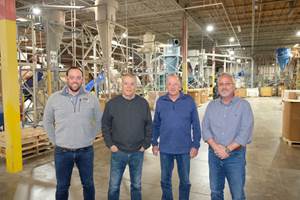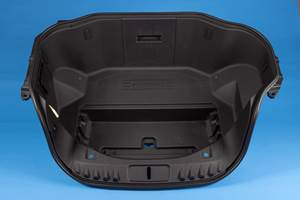Direct Connections for a Better Recycling System
Colorado’s Direct Polymers formed Brave Industries to link recycling collaborators.
In Colorado, recyclers and converters of plastics material are fewer and further apart than operations might be in a typical eastern state. This arrangement has influenced the development of , a hybrid waste consolidator and recycler in Denver.
By necessity, Direct Polymers works with the feedstocks available in the region. The supply made it impossible to focus on a particular niche, because no particular niche had enough volume. Instead, Direct Polymers takes on nearly every type of waste plastic from a variety of industrial sources. In some instances, Direct is acting as a redistributor of materials, the company also shreds, de-metals and grinds postindustrial plastic materials and also compounds polyolefins.

Reclaimed industrial scrap awaits reprocessing at Direct Polymers’ Denver recycling facility. Source: Trash Club Ventures
“We take everything. Initially, we were forced to get into every type, but that’s been extremely beneficial for both the processing and the brokerage,” says Adam Hill, CEO and founder of Direct Polymers. According to Hill, Direct has found competitive advantage in reducing logistics, handling and consolidation costs because of its hybrid recycling and waste consolidation model.
In the past year, Direct has been in the process of upgrading its Denver facility with a $1.6 million investment in capital equipment. The processing capacity was increased from 25 million pounds to 100 million pounds per year. Equipment includes Herbold grinders, an SSI shredder and Davis-Standard extruder.
Direct is setting itself up as a recycling hub for Colorado and surrounding states, but its vision doesn’t end there. The company looks to spread its “hub and spoke” model in collaboration with other companies, under . Brave was founded late last year with the goal of expanding strategic collaboration among recyclers, putting to use the knowledge gained from managing logistics of plastic flowing from place to place in the reclamation and recycling networks.
Brave Industries on Building Recycling Cohesion
With a few notable exceptions, most recyclers in the U.S. are small ´óĎó´«Ă˝es (despite processing tens of millions of pounds of reclaimed material every year, nearly all fall below the employee headcount threshold). Our recycling system exists as a network of these recyclers, along with waste management, scrap producers, other brokers and suppliers, and customers that convert the recyclate back into products. The model has both limitations and advantages.
The scale of participants makes the network flexible and resilient. Just in the past decade it has weathered the disruption of China’s Operation National Sword, the surge in demand during the COVID-19 pandemic, the subsequent collapse of that demand and, more recently, the oversupply of virgin and wide-spec material. Amid all the ups and downs there are resourceful and agile companies remaking plastic waste.
The recycling system is successful in reducing waste (both in the material sense and in the resources to make the materials) by remaking some percentage of plastic materials. The percentages do not change much over time, which could be seen as a miracle or a disappointment.
Size can be a limiting factor when it comes to timely deployment of capital, information sharing among constituent companies, and building deep experiential knowledge in specialized functions. Brave Industries is aimed at these limitations.
“We have to build better efficiencies on the front end by expanding this hub-and-spoke model to use more infrastructure that is close to the generation points for the scrap,” Hill says. “Small ´óĎó´«Ă˝ owners tend to be salespeople, advertising specialists, insurance agents — they do everything themselves, and so there’s a lot of inefficiency in that.” Brave is based on the idea that small ´óĎó´«Ă˝ infrastructure can be optimized if the owners can access the right resources, combining the advantages of a small company with the capabilities of a large one.

Direct Polymers processes a variety of recycled materials including polyolefins, producing this natural HDPE regrind among other products. Source: Trash Club Ventures
An example is quality management and testing services. Quality control is a challenge for some recycling plants and they often have to outsource testing. If a technological solution can provide box-level transparency, it improves confidence across the network.
“The crux is really to find similar-sized ´óĎó´«Ă˝es run by like-minded people and utilize, enhance and optimize the existing infrastructure,” says David Seeling, COO at Direct Polymers.
One of the ways Brave companies will collaborate is by using shared resources. A mobile shredder is about to be deployed for the network. When bulky items collect at one site, the shredder can be moved there temporarily and process them down to facilitate shipping. “We’re providing an option that currently doesn’t exist,” Hill says, “so instead of 10 companies trying to buy 10 shredding units, you share one or two units within the network.”
Some early wins have come from shortening supply chains. An assessment done on a cart manufacturer in the Pacific Northwest shaved off 10-15 cents per pound simply by having the carts disassembled and bailed by a company in that region before shipping to Denver. Opportunities like this are expected to increase as the network grows: The recent addition of extends Brave Industries into Arkansas and Texas.
Getting Ready for Extended Producer Responsibility
Colorado is one of several states that have passed legislation to set up extended producer responsibility organizations (EPRO), which require producers to support end-of-life management for their products after their distribution. The proposed plan for Colorado’s EPRO was recently submitted by the , and is currently under review by the .
This development is expected to bring new players into the recycling system, including brands seeking ways to incorporate recycled material. “Big companies that need to use recycled content are kind of lost, because historically the industry has operated without transparency,” Hill says. “Our job with Brave is to help plants recycle regionally. We can provide technical assistance, and connect them with the right compounders to help them utilize recycled content. We’re going in to act as a combination broker, consultant and infrastructure company.”

With Brave Industries, Direct Polymers plans to extend its model beyond the region. Left to right: Mitchell Best, Direct Polymers chief growth officer; Lillyann H. and Peter Calfee, founders of venture capital firm Trash Club Ventures; and Adam Hill, Direct Polymers CEO. Source: Trash Club Ventures
This has already happened with a supplier of commercial trash can material that Direct grinds. The molder had been attempting to incorporate 30% recycled content in their product, without success. “We said, ‘Here is a compound we work with, try running it at 100%,’” says Mitch Best, chief growth officer at Direct Polymers. “They were able to replace their virgin resin and lower their cost by about 30%. That’s the model right there.”
By building known solutions among partners and spreading them across the network, Brave Industries will also be aiming to de-risk the scale-up of recycling infrastructure. “Being part of the Brave Network increases our ability to deploy capital into that company, because it de-risks the entire opportunity,” says Peter Calfee, co-founder of .
Capturing Institutional Knowledge in Recycling
An advantage of closer connections between companies engaged in or adjacent to recycling is the preservation of knowledge. Solutions born from experience rather than theory and formalized research can be endangered when a ´óĎó´«Ă˝ closes or a founding member retires. Part of what Brave hopes to achieve is to find a way for these transitions to proceed while keeping the ´óĎó´«Ă˝es intact, and while capturing what Mitch Best calls the “ancient wisdom” for the benefit of the recycling industry.
“We learn as much from the people on the floor as we do from the people coming in with the machinery, because there are all these little nuances — this ancient wisdom from the industry always comes out. People like to say, ‘Oh people do things this way because that’s how they’ve always done it,’ but actually there are really good reasons for that,” Best says.
Caution can make ´óĎó´«Ă˝ leaders reluctant to come together and share their solutions, but this can be overcome when opportunities arise. “When companies we work with see that we bring them sales and send them feedstock through Brave, they become more willing to be transparent and share information,” Hill says. “Collective optimization always beats self-interest.”
Related Content
BASF Highlighting How They 'Make, Use and Recycle Future Solutions'
NPE2024: BASF is using its proprietary computer-aided engineering tool Ultrasim when designing for sustainability in a broad range of industries.
Read MoreEvolving Opportunities for Ambitious Plastics Recycler
St. Joseph Plastics grew from a simple grinding operation and now pursues growing markets in recycled PP, food-grade recycled materials, and customized post-industrial and post-consumer compounds.
Read MoreDow, Circusil Collaborating on Silicone Recycling Facility
Dow and Circusil announced plans to construct a silicone recycling facility in Kentucky.
Read MoreAutomotive Awards Highlight ‘Firsts,’ Emerging Technologies
Annual SPE event recognizes sustainability as a major theme.
Read MoreRead Next
See Recyclers Close the Loop on Trade Show Production Scrap at NPE2024
A collaboration between show organizer PLASTICS, recycler CPR and size reduction experts WEIMA and Conair recovered and recycled all production scrap at NPE2024.
Read MoreBeyond Prototypes: 8 Ways the Plastics Industry Is Using 3D Printing
Plastics processors are finding applications for 3D printing around the plant and across the supply chain. Here are 8 examples to look for at NPE2024.
Read MorePeople 4.0 – How to Get Buy-In from Your Staff for Industry 4.0 Systems
Implementing a production monitoring system as the foundation of a ‘smart factory’ is about integrating people with new technology as much as it is about integrating machines and computers. Here are tips from a company that has gone through the process.
Read More












